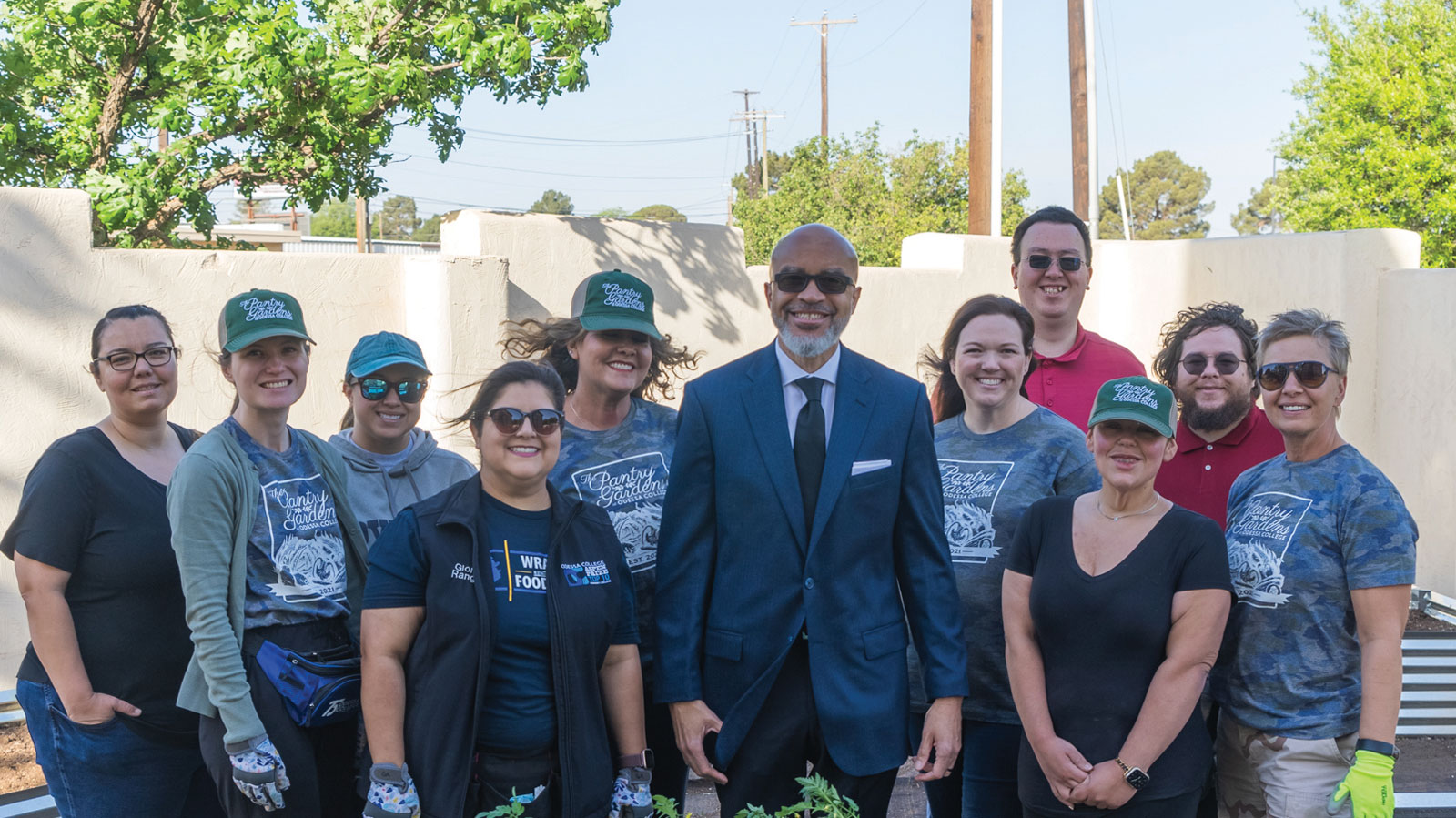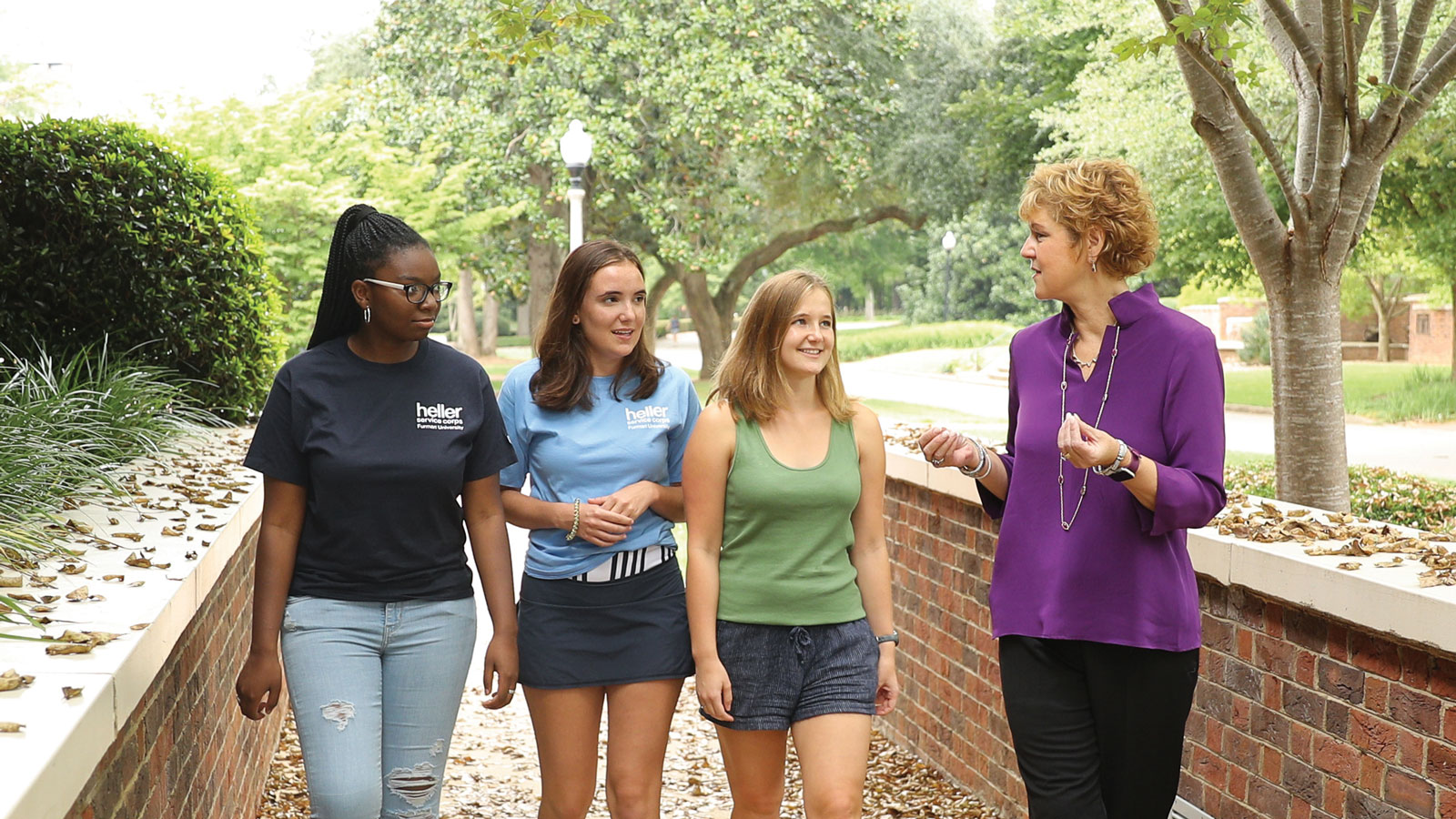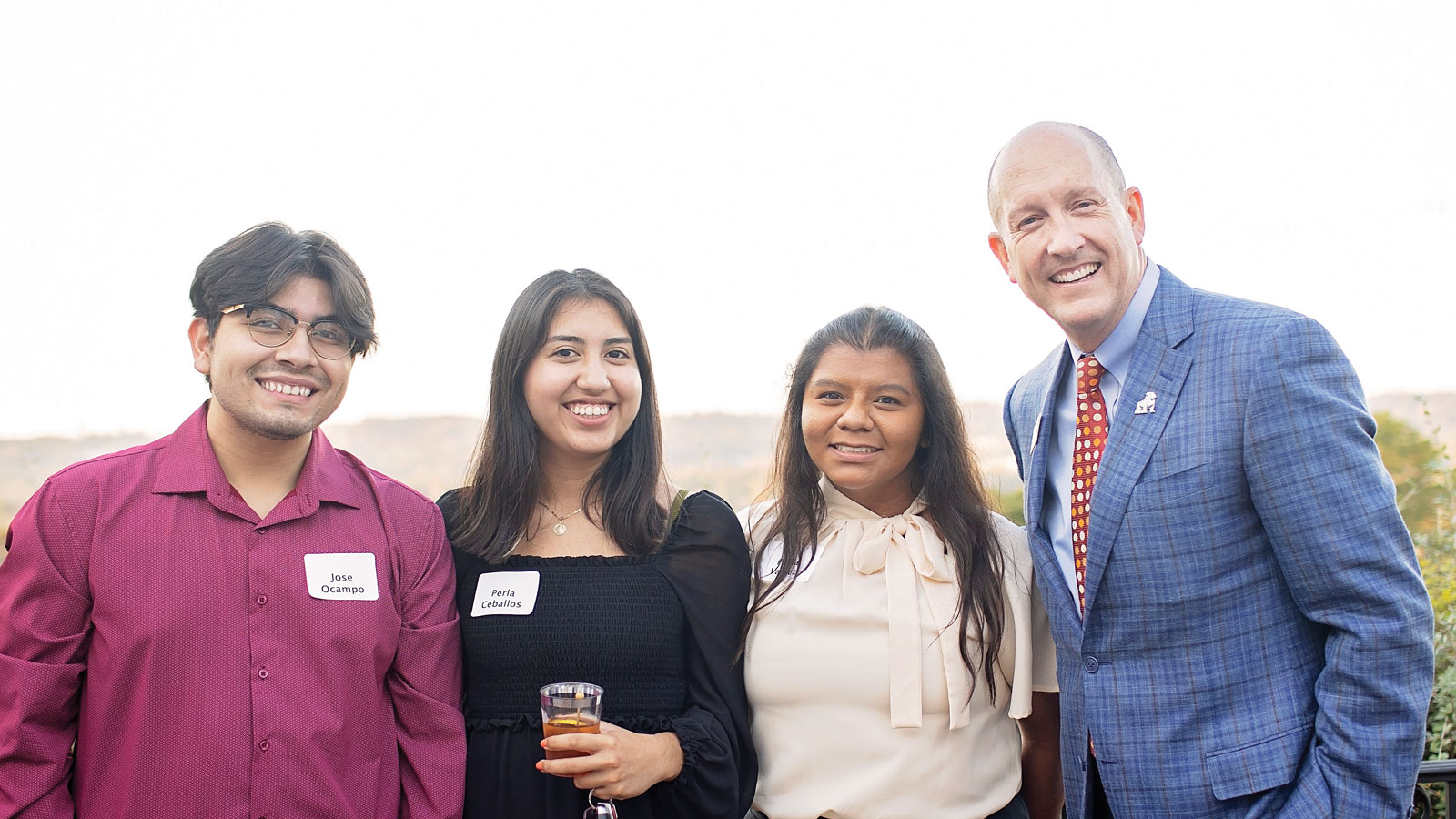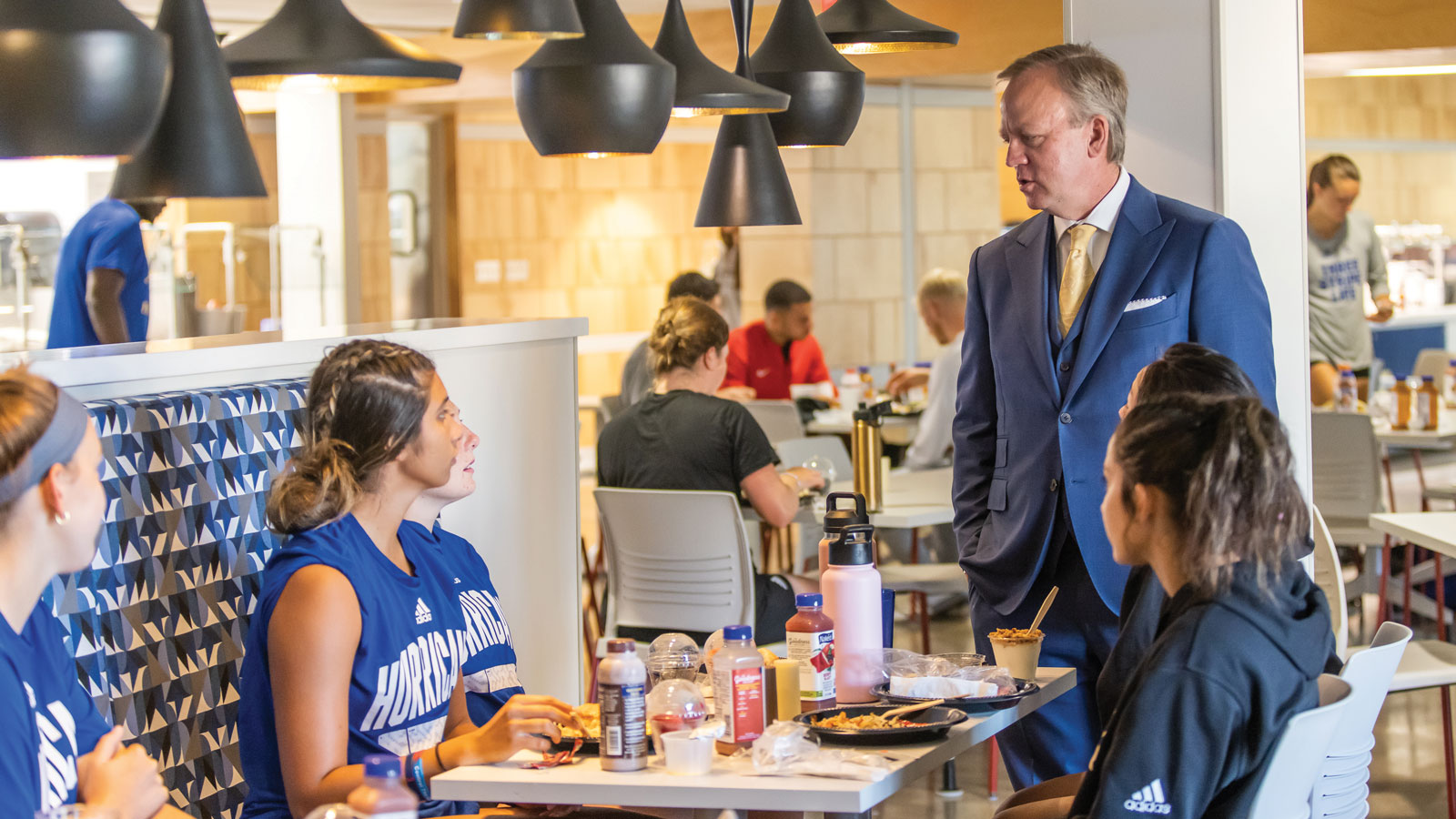Lessons in Leadership
Meet four Baylor alumni making a difference in the world of higher education
Having served as president of Odessa College since 2007, Gregory Williams, Ed.D. ’96, knows what it takes to be successful as a leader in higher education.
“Through relationships, through understanding people, through helping to motivate people, you can get things done,” he told the Midland Reporter-Telegram as he began his second decade as president. “What I enjoy about this work is changing lives. I’m excited about what we can accomplish next.”
Williams credits Baylor University with honing his leadership skills and expanding his horizons. He earned a Doctor of Education in higher education administration from Baylor in 1996 after an educational journey that included three degrees from the University of Texas Permian Basin (UTPB) — a bachelor’s in psychology, a master’s in mid-management education and a master’s in psychology.
“My time at Baylor, including my exposure to wonderful courses, professors and fellow students, was tremendous.” – Gregory Williams, Ed.D. ’96
“Baylor allowed me to think big and to believe anything was possible,” Williams said. “I was exposed to students and former students who were high-level administrators and were making a difference. I graduated knowing I could and should do my part to change the educational landscape.”
Empowering Wisdom
Baylor’s mission to prepare students for worldwide leadership and service has profoundly impacted communities and organizations around the globe, with its graduates becoming dynamic leaders in a wide range of fields, from medicine and business to engineering and the fine arts.
It comes as no surprise that one of those fields is higher education itself.
Williams stands as one of many Baylor alumni who has gone on to establish distinguished careers at other colleges and universities using the lessons they learned during their time at Baylor. Although the size and mission of their institutions may differ, these higher education executives — a group also including Beck Taylor, B.B.A. ’92, Ph.D., at Samford University, Elizabeth Davis, B.B.A. ’84, Ph.D., at Furman University, and Brad Carson, B.A. ’89, J.D., at the University of Tulsa — share a unifying and empowering source of wisdom and inspiration in the education they received at Baylor.
Becoming president of Odessa College marked a homecoming for Williams, who studied there in 1983 before going on to UTPB. His career path has included stops at Amarillo College, Midland College and Western Texas College, which he led as president for more than five years.
The city of Odessa is well known as the setting for Friday Night Lights and its location in the oil-rich Permian Basin. Williams also believes the area has untapped potential as a center for higher learning. Under his leadership, Odessa College has broken institutional records in enrollment, student retention and fundraising. In 2017 and 2019, the college received the Rising Star Award for Community College Excellence from the Aspen Institute.
Calling his decision to enroll in Baylor’s doctoral program in higher education “one of the best decisions in my life,” Williams said his experience on the Baylor campus gave him the worldview and inspiration necessary to seek greatness.
“My time at Baylor, including my exposure to wonderful courses, professors and fellow students, was tremendous,” he said. “I believe Baylor alums are prepared to make a difference.”
Impactful Mentors
Baylor University provided Elizabeth Davis with multiple perspectives on effective leadership in higher education.
She began her connection to the University as a student, earning a B.B.A. in accounting in 1984. A Texas native, Davis recalled the lasting impact that being admitted to the Hankamer School of Business had on her.
“I felt like I had found what I was called to do,” she said.
It was only when she started working in public accounting in New Orleans, however, that she fully appreciated the gifts Baylor had given her.
“I realized that the other young accountants hadn’t had the same mentoring opportunities I’d experienced — the relationships I had with my professors,” she said.
The five years she subsequently spent at Duke University, leading to a Ph.D. in accounting in 1992, left her with a similar impression of the unique qualities of a Baylor education.
“The expectations of how professors should approach teaching seemed very different at Duke than at Baylor,” she said. “After that, I had my heart set on returning to Waco.”
Baylor, in turn, welcomed her back with open arms. She spent 22 years serving her alma mater, beginning as a professor in the accounting department and culminating in the position of executive vice president and provost — the first woman to hold that title at the University.
“When I returned to Baylor, the environment felt much like what I’d experienced as a student. I had people looking out for my interests, people celebrating my becoming a mother,” Davis said. “As provost, I had mentors in many departments who helped me learn how universities operate effectively. I have since learned, from my presidential colleagues, that such wide-ranging exposure to all areas of operation is unusual.”
Dynamic Collaboration
When Davis became the first female president of Furman University in 2014, she immediately began applying the principles of leadership she had learned at Baylor to her newfound responsibilities.
“When I arrived at Furman, I didn’t find the same level of collaboration I’d come to value at Baylor within the president’s executive council,” she said. “I needed to change the culture, to bring together a leadership team that collaborated on such matters as strategic thinking and board meetings.”
As the oldest private institution of higher learning in South Carolina — located in Greenville, at the foothills of the Blue Ridge Mountains — Furman has a long tradition of excellence built on the foundation of its required liberal arts curriculum.
As president, Davis has overseen a decade of adaptation and innovation while remaining focused on the experience of its roughly 3,000 students. In doing so, she has helped the institution — which officially became secular in 1992, although keeping Christo et Doctrinae (For Christ and Learning) as its motto — return to its spiritual heritage.
“When I became president, there wasn’t a strong legacy of being a Baptist institution. I had some faculty members tell me we didn’t need to consider religion or spirituality anymore. I told them I didn’t think that was correct,” Davis said. “Students’ faith journeys are an important part of their overall development. Today, according to our chaplain, our communal religious life is more robust than it was when I came.”
Formative Experiences
Beck Taylor left Baylor almost two decades ago to pursue compelling opportunities in higher education leadership — including serving as president of Whitworth University in Spokane, Washington, and his current role as president of Samford University in Birmingham, Alabama — but his roots in Waco remain strong.
In fact, Taylor’s Baylor experience goes all the way back to his childhood days in Houston.
“Each summer, I would venture to Waco to participate in Baylor Camp under the direction of Dale Connally,” he said.
“It wouldn’t surprise me if Baylor has more institutional presidents and other higher education leaders relative to its size than many other universities.” – Beck Taylor, B.B.A. ’92, Ph.D.
Taylor joined other boys and girls for a week of exploring Baylor’s campus, including living in Kokernot Hall, canoeing on the Brazos and enjoying milkshakes in the SUB.
“Those experiences were so formative for me that when it came time to choose where to study, Baylor was at the top of my list,” Taylor said. “I always wanted to be a Baylor Bear.”
Taylor earned a B.B.A. in economics and finance from Baylor in 1992. He remembers his professors in the Hankamer School of Business as exceptional models of the academic life who instilled a love for learning in him that still burns brightly today.
After working as an analyst for Andersen Consulting (now Accenture), Taylor’s educational journey continued at Purdue University, where he earned an M.S. and Ph.D. in economics in 1995 and 1997, respectively. Like Davis, his counterpart at Furman, Taylor then immediately returned to Baylor, where he began serving as an assistant professor of economics and eventually became an associate dean and the first holder of the W.H. Smith Professorship in Economics.
Honoring God
Taylor began his tenure as Samford’s president in 2021. Alabama’s top-ranked private university, Samford was founded in 1841 by Baptists and has a student enrollment of almost 6,000.
As the institution’s leader, Taylor said he has placed the student learning experience at the top of Samford’s priorities.
“As was so true for me at Baylor, college is a coming-of-age experience for undergraduates,” he said. “So, I spend considerable time with faculty and staff at Samford developing programs that give students ample opportunities to explore the curriculum and to engage with a robust co-curriculum through residence life, student activities, spiritual formation and athletics.”
Also paralleling his Baylor education, Taylor has put Christ first at Samford.
“From my time at Baylor, as both a student and a faculty member, I saw the extraordinary efforts made to pursue excellence as a witness to our faith in Christ,” he said. “That same pursuit of excellence and the desire to honor God drive my energies and efforts at Samford.”
Serving as a foundation for that pursuit of excellence is a new strategic plan called
Fidelitas (“fidelity” or “faithfulness” in Latin) that emphasizes Samford’s Christ-centered educational mission and aspires to elevate every area of the university.
Taylor noted that, during his time as a university president, he has come to know many fellow Baylor alumni in leadership roles throughout higher education.
“To a person, they are extremely talented, driven by a desire to make real and lasting impacts and seen as thought and practice leaders,” he said. “Those similarities across so many people point to the impact Baylor and its people must have made in many lives. It wouldn’t surprise me if Baylor has more institutional presidents and other higher education leaders relative to its size than many other universities.”
Modeling Aspirations
Brad Carson said he continues to learn from Baylor University even though his days as a student ended more than 30 years ago.
“Watching Baylor go from Carnegie R2 to R1 has been inspiring, as we are trying to do the same thing,” said Carson, who has served as president of the University of Tulsa since 2021. “I’ve tried to study Baylor’s trajectory over the last 25 years for lessons.”
A distinguished and wide-ranging educational journey and career path prepared Carson for the responsibilities of leading the private, non-denominational university, whose roughly 4,000 students enjoy a nine-to-one student-faculty ratio.
“Baylor has a beautiful combination of outstanding teaching, terrific research and a welcoming community.” – Brad Carson, B.A. ’89, J.D.
After earning a B.A. in history from Baylor in 1989, he studied at Oxford University as a Rhodes Scholar — becoming one of only five recipients of the prestigious scholarship in Baylor’s history at the time — and received a master’s degree in politics, philosophy and economics. He returned to his native state of Oklahoma for law school at the University of Oklahoma, graduating with a J.D. in 1994.
Carson’s studies propelled him into a career that, before being appointed as Tulsa’s president, included two terms in the U.S. House of Representatives — where he was the only enrolled Native American tribal member (Cherokee Nation) — as well as active duty in Iraq as a naval intelligence officer, high-ranking civilian positions in the Department of Defense and service on the faculty of the University of Virginia.
Focus on Teaching
When asked what aspects of his philosophy and practices as Tulsa’s president were shaped by his Baylor experience, Carson pointed directly to the classroom.
“The extraordinary teaching was what most influenced me,” he said. “When I later went to Oxford, I met people from the world’s most famous schools, places like Harvard, Princeton, Yale and Stanford. I quickly realized the education that Baylor faculty provided me was equal to or better than any of those universities. At Tulsa, I’ve tried to recreate that intimate teaching atmosphere that I found so appealing at Baylor.”
The strategic plan Carson is implementing at Tulsa builds on the institution’s deep roots in the energy industry by blending liberal arts, professional studies and career support to produce students who are prepared to assume leadership roles in their fields. It’s a dynamic mixture of experiences that he said mirrors what he found during his four years in Waco.
“Baylor has a beautiful combination of outstanding teaching, terrific research and a welcoming community. I’ve learned that this combination is, in fact, quite rare, and it’s something I’d like to achieve at Tulsa.”
Almost 40 Baylor Bears serve as the top executives at colleges and universities around the world. Here’s a quick rundown of those currently serving as presidents and chancellors:
Baylor Bears leading colleges and universities worldwide



